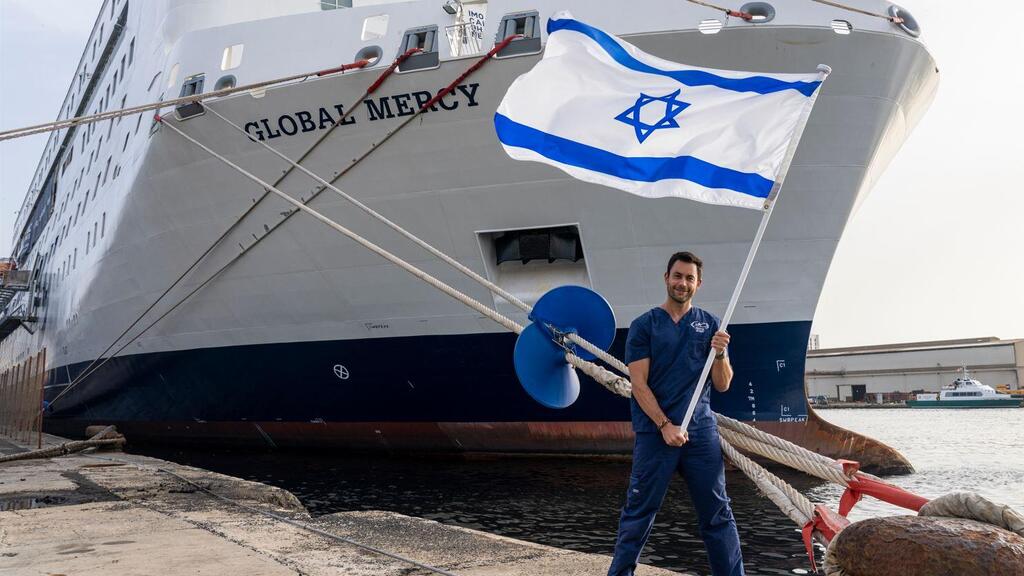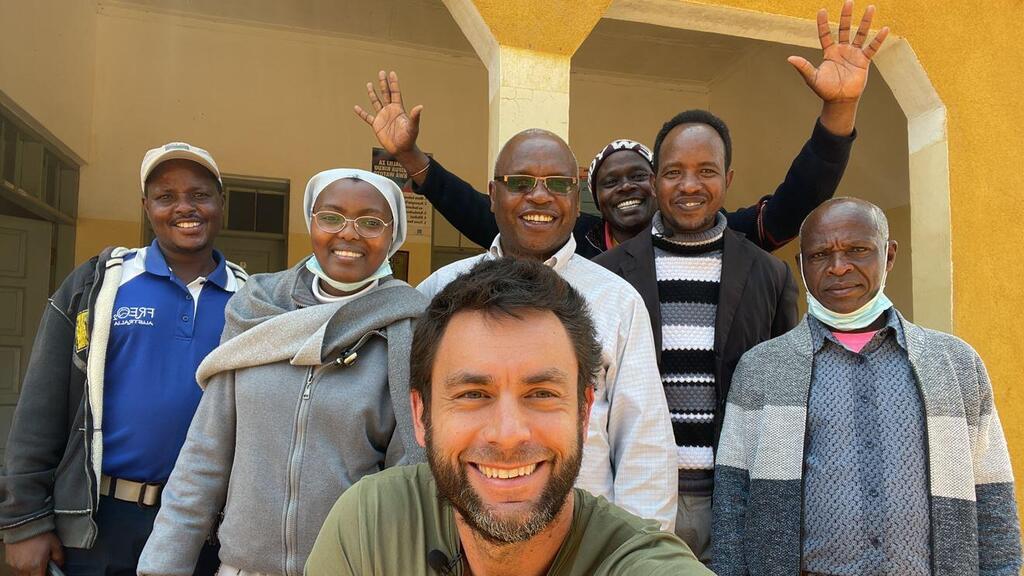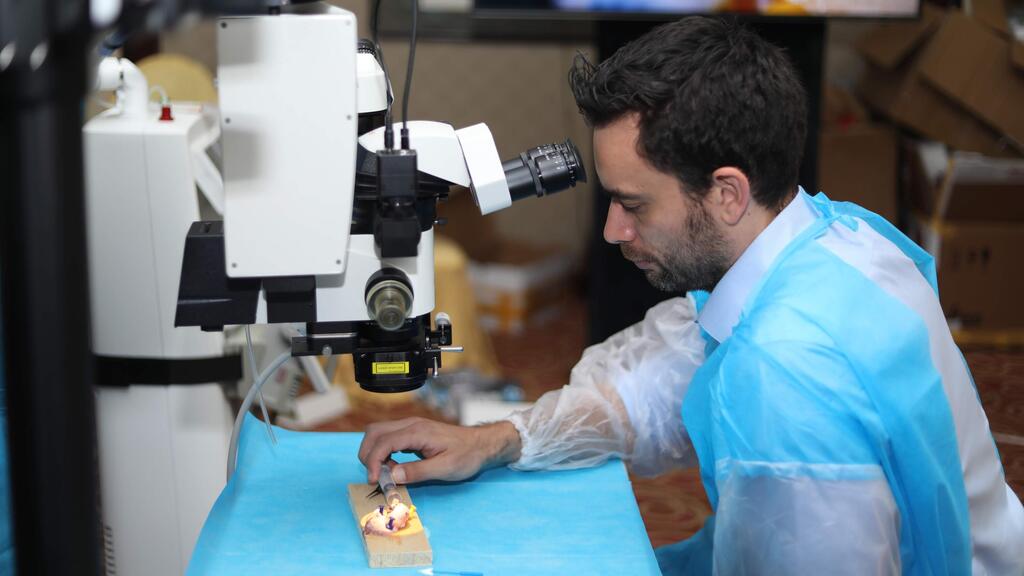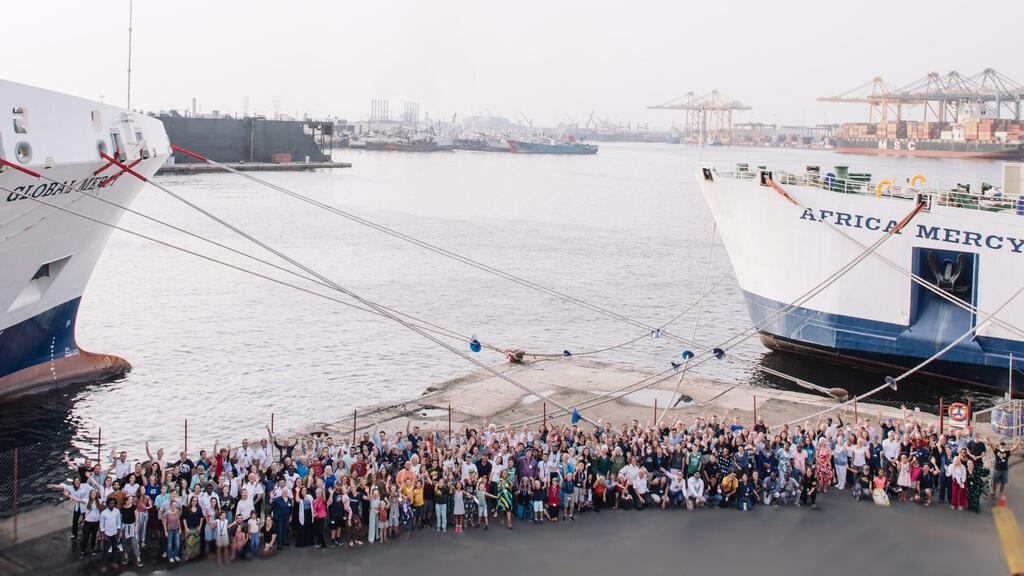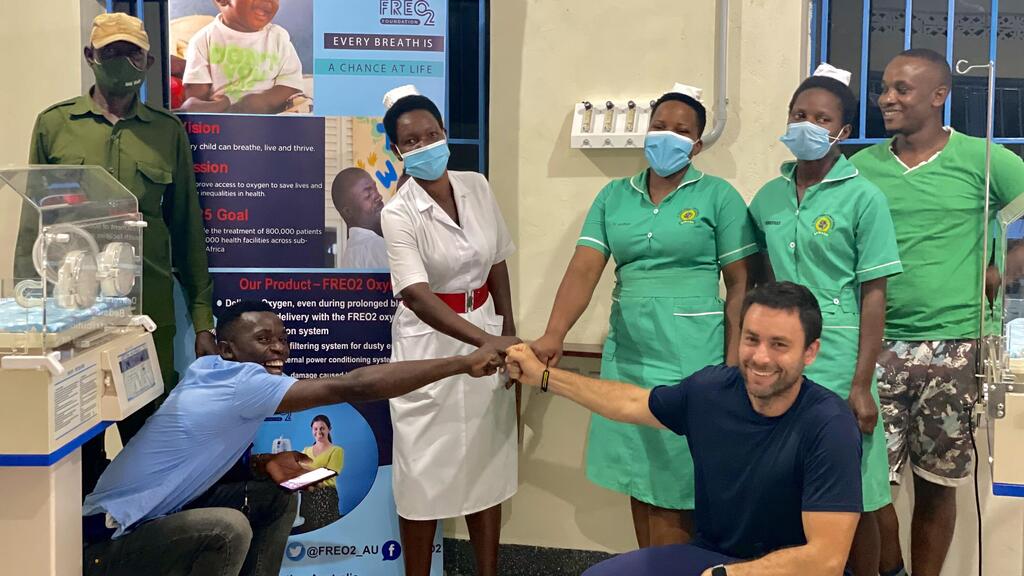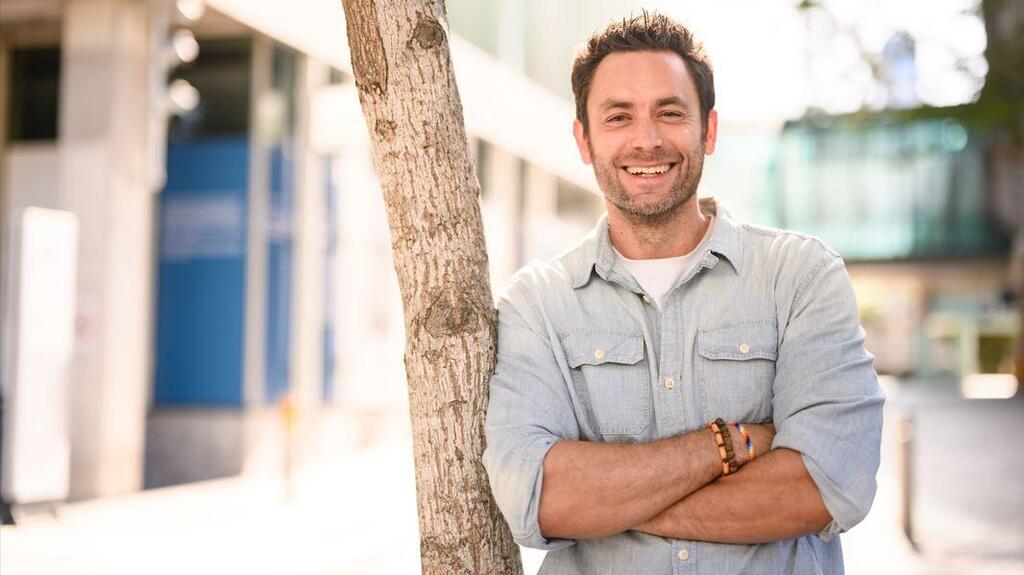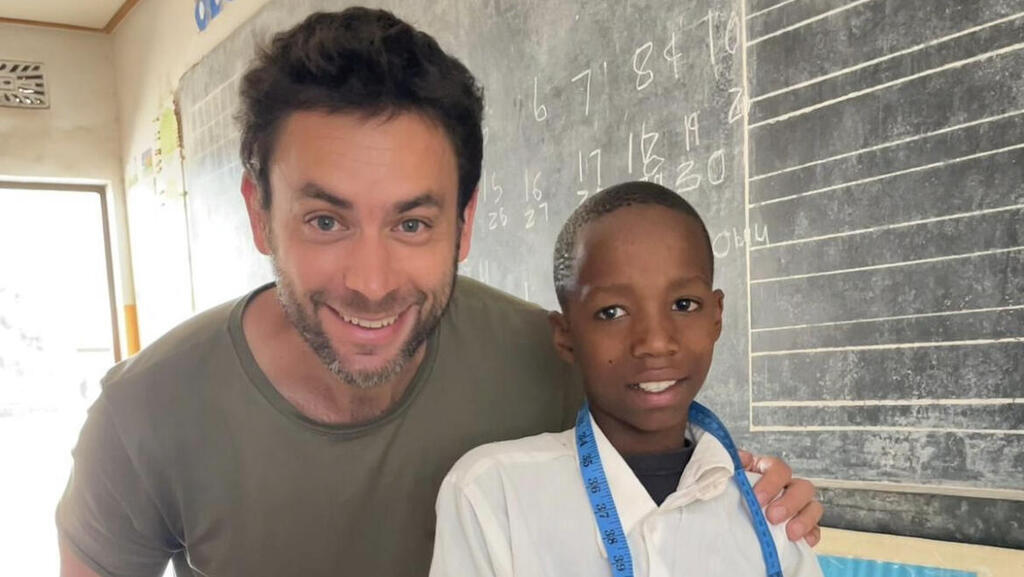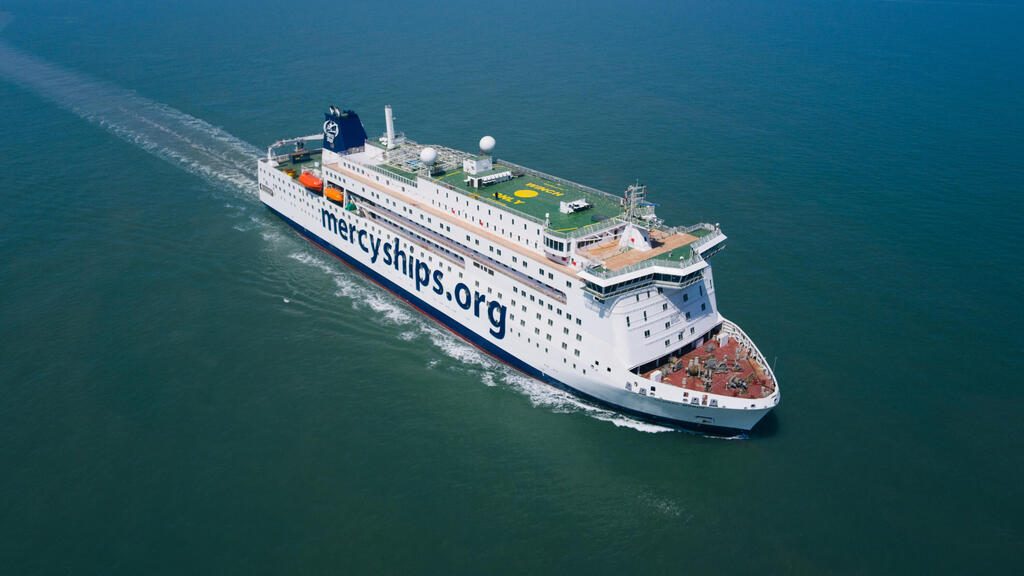Getting your Trinity Audio player ready...
“This ship is a miracle,” exclaims Israeli biomedical engineer Achi Kushnir. He’s talking about the MV Global Mercy, the world’s largest floating hospital. Kushnir left Israel's shores and his former life last year to board the Mercy. He was following an inner drive he’s always felt – to make the world a better place.

And there’s no better place to do that than aboard the Mercy. This humanitarian project provides life-saving operations to poor, abandoned, poverty-stricken populations across Africa who have no access to medical infrastructure or even satisfactory medical care.
“I applied and set out to Africa,” Kushnir tells Ynetnews. “It was in July 2021. I didn’t even know I’d be on a ship.”
His first stop was Congo, where he waited to see if his application to volunteer on the ship had been approved. In the meantime, he volunteered in a hospital founded by two missionaries in the city of Lubumbashi in the southeastern part of the Democratic Republic of Congo.
Were you really motivated by desire to make the world a better place, or was it just an adventure?
“I’m definitely an adventurer. When I told my friends I was leaving my job and applying for the Mercy, they said stuff like ‘What do you think you’re doing?’ I told them it was part of my journey – diving into the unknown and proving that amazing things happen when you go with your gut and step out of your comfort zone. I’m not a 9-to-5 kind of guy. I love the adrenaline.”
"I decided that we had to do something"
Kushnir is 42, single and was born in Australia, where he studied biomedical engineering.
“When I was 24, I did a residency in a private hospital. With a friend, Thao, I found some medical equipment in really good condition in a storeroom. We asked the director what they were going to do with the equipment. He told us it was going to be thrown away as they get a budget every five years for new equipment. But the equipment lying in the storeroom was in great condition. It could save lives," Kushnir explains.
"I decided that we had to do something with it. We got the hospital director on board. She donated the equipment to us. Our university flew us to a region of isolated villages in rural Papua New Guinea.
"We gave the basic equipment to seven medical centers in the area. This very much shaped the way I started seeing things. For the first time, I saw the differences between our lives in the privileged West and other places where they have no infrastructure, no electricity, no water in the faucets and no medical care, “ he says.
This discrepancy moved Kushnir to begin mapping out his own reality and his first initiative of transferring old medical equipment from the rich West to poverty-ridden regions of Africa.
Then the idea of setting up a local hospital took off. The group of friends got hold of some money and investors, and recruited students from around the globe who had both the adventure bug and a genuine desire to help. Their vision was almost fulfilled when the 2008 global financial crisis hit, putting an end to all the plans.
“We were volunteering on the project and supporting ourselves with temporary jobs in Africa. I was teaching English. Thao drove a cab. Other volunteers also found jobs, but at the end of the day we were all health technology engineers –future doctors who had graduated – and we needed to get on with our lives. Our dream dissipated and we dispersed,” Kushnir says.
It took him 11 years to get back to Africa. In that time, he worked in the public sector in Sydney setting up medical infrastructure in hospitals, accruing the skills to take him to the next station in his life in 2010; not Africa, but Israel. Kushnir had family here including a 90-year-old grandmother who hoped she would get to see him.
“She lived to 103. I had eight wonderful years with her here in Israel. My parents also came back to Israel. At long last, I was close to my family and to our history," he says.
Kushnir has been living in Israel for the past 12 years. He worked in medical computing and got into high-tech. In his most recent job, he flew all over the world training eye doctors how to adapt to innovative technology.
"It really scared me. I took baby steps"
“The voice in my head wasn’t going away. You know you should use all your abilities to help the weakest people, but reality always pulls you back. I had great working conditions,” he says.
And then the global pandemic hit – hurtling him straight into that dream.
“I was suddenly taken off all the flights and furloughed for three months. I had time to take stock of my life and look at where it was going. I reminded myself that, deep in my heart, I have a dream and I was doing nothing to make it come true. It’s never the right time to leave. But that’s it. I’m not going to be governed by my fears and then have regrets when I’m 80. I quit my job," he tells Ynetnews.
“It really scared me. I took baby steps. I handed in my personal equipment, bought a new computer and a new phone because I thought that if I wasn’t working anymore, I wouldn’t have the money in the future to buy things. Three times I said to myself ‘I’m quitting,'" he says.
"It was only on the third time that I plucked up the courage to tell them at work. The moment I told them, I knew it would be okay. People around me didn’t understand. We were in a pandemic, people were losing their jobs, why was I quitting? But I had to go with my heart and deal with my fears. I applied for the Mercy and bought a plane ticket.”
You get to Africa to a hospital run by a couple of missionaries?
“Yes. I knew that I was there primarily to learn, to get to know the inspirational organizations working there, experience hardships, understand what works and what doesn’t, live with the locals in the same conditions as them, and just wait for an answer from the ship. I said to myself: ‘I’m not going to be a biomedical engineer. I’m going to be a sponge. I’m going to learn, so that I can see what else I can do’,“ he says.
“The second time I went to Africa, I started volunteering in a school called ‘Malaika’ – Swahili for ‘angel.’ Why angel? Because this school is a refuge for the weakest sector of society – young African girls caught in a vicious cycle of poverty. They are married off at the age of 12. They have no control over their lives. They don’t even have any dreams, or the hope of developing any aspirations," according to Kushnir.
These girls have a guardian angel in the person of Noëlla Coursaris Musunka. Born in Congo, Musunka achieved success as an international model and decided to devote herself to working for young girls in her homeland.
Musunka chooses the poorest girls – aged 3-14 – from the weakest regions. These are girls who have no chance of surviving in poverty. With the help of local teaching staff, she provides them with food and education.
Her project receives support from huge global companies such as Microsoft. The girls come out of her school, educated and with language skills, knowing that they can strive for better things, beyond being poor, taking care of the home and serving their husbands.
Kushnir's next post was with the Health and Justice organization, founded by a Congolese doctor and lawyer duo in the jungles of eastern Congo. Then he moved on to Tanzania, hoping to continue to Uganda en route to the ship. As COVID continued to spread, he got stuck in Tanzania, where he found himself, once again, on a mission. Kushnir set up a medical initiative to save children born with life-threatening respiratory conditions.
"I visited 22 medical centers mapping out where would be best to place medical technology"
“Quite by chance, I found online a friend from university who chaired a medical organization for children," he says. "I asked her if I could volunteer for the organization. It then turned out that the strict lockdown in Melbourne meant that they couldn’t even leave the house and couldn’t get themselves to Tanzania to operate the initiative they had founded themselves to save babies. For her, it was as if I had been dropped down from heaven.”
So you became their Australian in Tanzania?
“Indeed. The organization aims to save the life of any baby by providing an ongoing supply of oxygen. In remote areas such as these, access to oxygen machines is a matter of life and death for babies with respiratory problems. In the first stage, with a local team, I visited 22 medical centers mapping out where would be best to place this medical technology.”
Accompanied by an African Catholic nun, Panga, Kushnir travels to medical centers funded by the Catholic Church. She estimates the number of births and how many babies are born with respiratory problems, checks to see how many of them had pneumonia, and how many had died due to lack of oxygen. Using this data, they decide where to put which type of medical technology.
Kushnir identified 12 medical centers where he found an acute need, then flew to Uganda to inspect installations of similar systems by local teams. “I had a eureka moment the first time I installed this system. I was on a high. I realized that the information I had passed on to the doctors and nurses in 12 villages in Africa will save children’s lives. No high-tech job in the West can compare to this feeling,” he says.
After two years of the global COVID pandemic, Russia invaded Ukraine. A Ukrainian doctor volunteering with Kushnir in Africa told him about the humanitarian needs in her homeland. Just as Kushnir had fulfilled his mission in Africa, he then flew to Europe.
"When I told them I was on my way from Africa to Ukraine, all they had to say was ‘We’re surprised you’re not already there’"
He landed on the Hungarian border, made contact with local doctors and organizations, and simply reported for duty offering to do whatever was necessary to help, including: transportation of medical equipment on trucks from Hungary into war zones; operating logistics; collecting and purchasing equipment from Hungary and bringing it to the border and passing it to volunteer drivers taking it into Ukraine in vans.
He communicated with clinics and doctors in areas under attack, trying to supply them with whatever they needed. He helped out receiving refugees. “The Jewish community has absorption centers. I kept telling myself that I was in a movie. It was like being in a film from the Second World War, only in color," he says.
Weren’t your parents going crazy?
“It’s funny. When I told them I was on my way from Africa to Ukraine, all they had to say was: ‘We’re surprised you’re not already there.’ I think when I quit my job and took off they took it quite hard. But they know I’m serious about it, that it’s right for me and they’ve been supportive ever since. They also see that I’m growing and I’m doing what I love. “
Do you have a family of your own?
“I’m working on it. Not yet.”
For three months on the Mercy, alongside dozens of other engineers volunteering from all over the world, Kushnir has been installing various medical devices and checking existing machinery. “The ship’s crazy,” he exclaims. Excitedly, he displays pictures on his phone. “This is a 12-story cruise liner that they’ve made into a floating hospital. It has six operating theaters, 200 beds, a rehabilitation center, medical laboratories and classrooms.
"They carry out operations to fix cleft palates, cataract operations, operations removing growths. In Africa you see people walking around with huge, benign tumors – the size of a watermelon. It’s a weight that a person carries around with them simply because there’s no treatment. It’s amazing to be able to help these forgotten people, who have no other chance of survival," Kushnir says.
At any given time, there are 500 volunteers on the ship. Everyone serving on the ship is a volunteer. People make a lot of personal sacrifices to be on the Mercy, including being away from partners and family. Some volunteers bring their families on board, so the Mercy also has equipment for long-distance learning for the children. Volunteers include experienced senior doctors working alongside recent graduates.
A ship of cooperation
The ship has everything from cleaners, cooks and engineers operating the ship to world-leading specialist surgeons. And everyone is equal. The surgeon knows that without the cook preparing food and the people operating the ship, nothing can move. Egos are put aside. No one’s getting paid, anyway. People are judged solely on how modest and empathetic they are and how much they want to help.
"You don’t meet a lot of people like this in a lifetime," according to Kushnir. "There are 300 people like this on one ship! You couldn’t dream of a more valuable human asset. Being the first Israeli and Jew on board a ship run by a Christian organization was also very special for me ."
How were you received on the ship?
“Like a brother. I was there over Pesach (Passover) and they got some matzahs especially for me, and in the Easter ceremony everyone ate matzah and they did a little ceremony reminiscent of the Jewish Passover. I lead it in Hebrew prayer. It was a great honor to represent our country and culture.”
What did they know about Israel?
“Not much. They didn’t know what Israel was or Judaism is. They didn’t know about Tikkun Olam (repairing the world) in Judaism. I also learned a lot about Christianity. It really brought people together, especially when the ship’s a Christian initiative, not just in terms of the crew, but also its funding. The ship offers medical services to a population that is mostly Muslim. They embrace all people.”
Since returning to Israel along with his brother, Kushnir has founded Wellplay, a digital platform for mental health support, based on psychodrama methodology and artificial intelligence.
His current mission is to tell the story of his journey and tell people about the Mercy and open doors for more Israelis to become engaged.
“I’m still involved in two projects – one providing prosthetics, the other providing oxygen. I’m a paid consultant for both of these organizations and I want to contribute to collaborations with high-tech companies."
It's also important for Kushnir to pass on everything Africa has taught him. He lectures in academic institutions, high schools and workplaces. “If thousands of people set themselves missions, the change can be marvelous," he says.
First published: 14:21, 04.26.23



